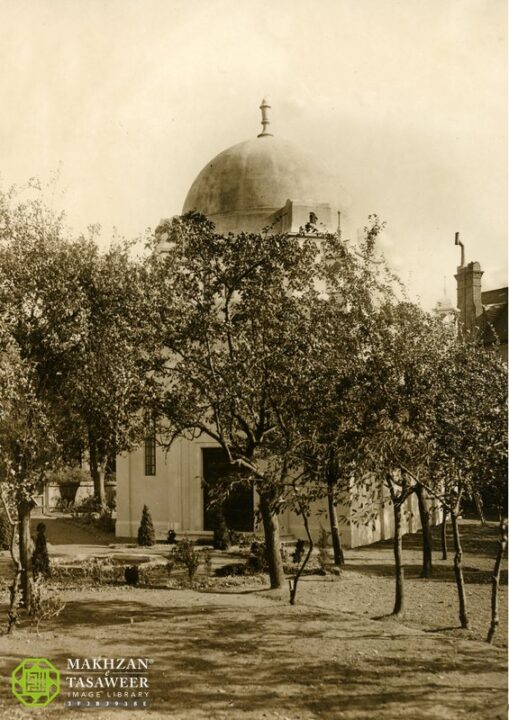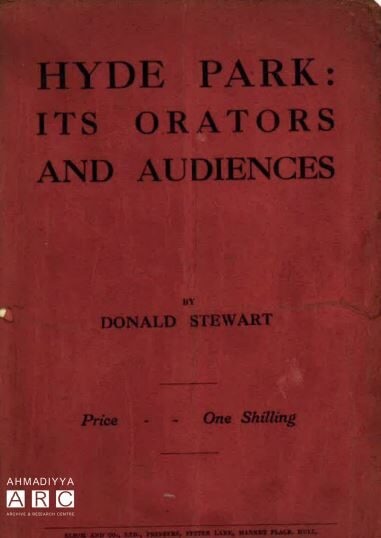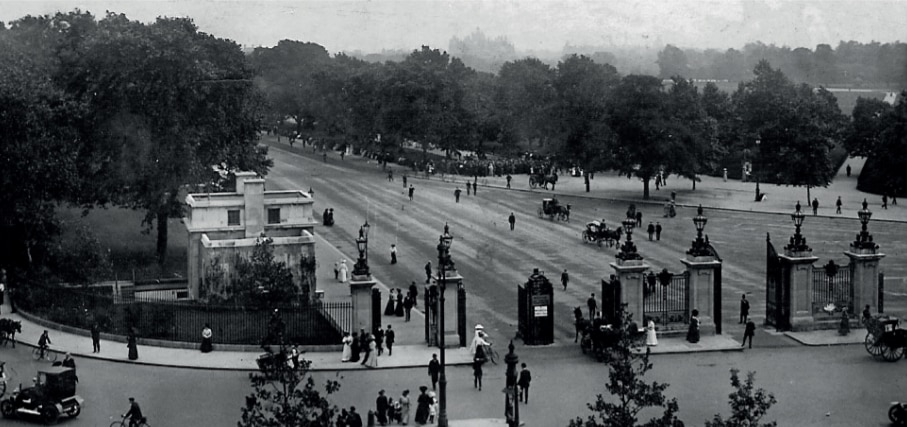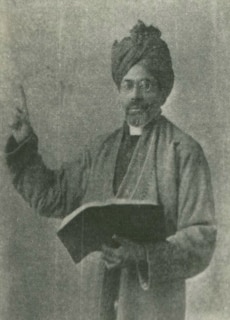Tahmeed Ahmad, Ahmadiyya Archive & Research Centre (ARC)

مَیں تیرى تبلیغ کو زمین کے کناروں تک پہنچاؤں گا
“I shall cause thy message to reach the corners of the earth.”
This is the divine promise made to Hazrat Mirza Ghulam Ahmadas of Qadian. We can observe evidence for the fulfilment of this promise in our daily lives through MTA, numerous publications, missionary endeavours, and regular Ahmadi Muslims participating in preaching, etc. However, this promise took effect from the moment it was revealed and as a result, we occasionally come across reminders of our past and the extent to which this message was spread. The ARC has discovered published works in English from the time of the Promised Messiahas, including long forgotten images of past companions and countless mentions of the Community in historical papers and publications.
One such piece was found in a book from 1925 titled Hyde Park: Its Orators and Audiences by Donald Stewart. In an effort to continue this historical theme, we present a book review from almost 100 years ago just to give some insight into our latest find.
Book review
“Hyde Park: Its Orators and Audiences. By Donald Stewart Elsom and Co., Hull, 1925, pp. 32.
“This pamphlet is a lively description of the speakers at Hyde Park, and their audiences. Various speeches and arguments are summarized, and specimens of the heckling reproduced. Mr. Stewart takes advantage of the opportunity to insert a socialistic speech of his own. His study of Hyde Park does not seem to have given him a style that would command the attention of an out-of-doors audience. E. L. HUNT, Swarthmore College.”(Dolman J, Travis LE, Cable WA, Hudson HH, Hunt EL. 1927. New books. Quarterly Journal of Speech. 13[1]. p. 85)
Now that we have some basic idea of what book we are dealing with, let us now turn to the obvious question: What does that have to do with the Ahmadiyya Muslim Jamaat?
To answer the question, we have the testimony of someone who was a regular speaker at Hyde Park, Hazrat Maulvi Abdur Rahim Nayyarra. He was one of the community’s pioneer missionaries, having served in Sierra Leone, Nigeria, Ghana and England. During this time he would write reports back to the headquarters in Qadian, India. Reports like these would come from missionaries all over the world and later get published in Al-Fazl, the community’s newspaper at the time.
Ahmadiyyat: To the Corners of the World by Hazrat Maulvi Abdur Rahim Nayyarra
“London: There is a red leather book on the table in front of me. This is written by an English gentleman, who is a clever friend of ours named Mr James Stewart. I can imagine him standing with his book. I am familiar with his face. I am aware of his way of speaking. I remember his questions being filled with criticism. In the days when London’s most skilled speakers were standing near Marble Arch, Hyde Park, trying to influence the local and foreign visitors coming for trade or travel with their own point of view, in the capital city of Great Britain. In those days, our friend would take pen and paper and write summaries of the speakers’ speeches. The name of this book is Hyde Park Orators and Audiences.

“In this, the representatives of the Ahmadiyya community and the Ahmadi speaker, wearing a green turban, are specifically mentioned. Mr Stewart writes: ‘Who is this man in the green turban, reading eloquent words in a foreign language? And around him, people have gathered attentively from there and here. Our friend is Indian. The melodious foreign language speech has ended. Now he is starting to express his religion in proper English.’ After this, he summarises my speech and provides some questions and answers.
“This book brings back memories of those days. When I used to be so exhausted after speaking for hours, I would find it difficult to even rest. And seeing how people would ignore me, made me so anxious and sad that sometimes, my despair would show itself from afar in a scary form, which I used to suppress by showing the utmost faith. However, now this book will be read by the followers of every religion and community. And they will surely be given the knowledge of Islam and Ahmadiyyat through me. […] All praise is due to Allah.
“Along with this blue book, we have the reports of our missionaries in London. In the world’s largest city and the centre of Christianity, they are successfully fulfilling their duty of preaching Islam through lectures, sermons, writing, and meetings. The Ahmadiyya London Mosque, near Wimbledon Common, with its white dome, within its apple, pear and plum trees, is shining proof of Ahmadiyya under London’s dark sky. After the completion and opening of the mosque, the first imam will be Maulvi Abdur Rahim Dard Sahibra. And Sheikh Fareed Sahibra will recite the first call to prayer, voicing aloud ‘Allahu Akbar’. And Nayyar is grateful, knowing that the foundation of this mosque was laid by the hands of Khalifatul Masih [IIra] and during my service in London. And the current imam is its namesake. And the Ahmadiyya Community is rightfully blessed for its prayers, efforts, and sacrifices, as a result of which, its members have become the practical example of: مغرب کى وادیوں میں گونجى اذاں ہمارى [Through the valleys of the West, our call echoes]. فالحمد الله علىٰ ذلك [Surely, all praise is due to Allah].” (Al Fazl, 14 May 1926, pp. 1-2)
Truly, all praise is due to Allah, and it is through His blessings that we are able to locate this book and bear witness to how He upholds the promise made to His prophet.

An extract from the book
“Now that we have arrived, and have conducted a general survey, scrutinised the faces of the orators, and read the inscriptions on the signs and banners, the question arises: to which crowd shall we attach ourselves for a little while, and to which speaker shall we give priority? I suppose if we are to act on the democratic principle, that as the propagators of Christianity are in the majority, compared with those who are expounding political and social ideas, it should be one of the former. But which shall we choose? They are so many; and, rightly or wrongly, there still continue to be divisions amongst them. A state of affairs by no means new, going back as it does far beyond the period of Martin Luther and Bluff King Hal, even to the time when the Twelve, on the way to Capernaum, had disputed among themselves who should be the greatest. But fate has settled the question: the Gordian knot is cut.
“Who is this somewhat picturesque individual who, by chanting in some foreign tongue a kind of incantation, is already attracting an audience? An Indian, apparently. Let us go and listen to him. It is but common courtesy to a stranger within our gates. The droning has now ceased, and he begins to speak in good English, and in a businesslike way!

“Without wasting time, he informs us that his purpose is to explain the precepts and principles of the Mohammedan [Islamic] religion. There are, He says, three great religions closely related to one another – these being, those of the Jews, the Christians, and the Mohammedans [Muslims]. But they are divided in their opinions regarding Jesus Christ. The Jews claim that he was an impostor; the Christians say he was the Son of God; while Mohammed[sa] said he was merely a prophet. Mohammed[sa], who praised him, said that Jesus did not die on the cross, but merely swooned. His legs were not broken. Although placed in the tomb by Joseph of Arimathea, Jesus was taken from there by the Essenes – the brotherhood of monks to which he belonged, and after recovering went out to the East, finally being buried in the valley of Kashmir. In Kashmir, the people are very similar both in features and manners to the Israelites. Even the names of the towns are the same.
“Mohammedans believe there is a certain amount of good in all religions, although they also contain some errors. Christianity had departed from its early purity and simplicity. Mohammedans did not believe in the Trinity, but in one God-Allah. Just as Jesus came after Moses as a prophet, so did Mohammed[sa] come after Jesus. God sent prophets at various times and places. Mohammed[sa] taught (1) that there is only one God, (2) the practice of prayer, (3) fasting, (4) self-sacrifice, (5) pilgrimage to Mecca and the doing of good. There are no dogmas or mysteries in their religion – no pictures, crosses or crucifixes.
“It appears that the Mohammedans are not in entire agreement amongst themselves, for the speaker says that he is not an orthodox Moslem. While the latter believes that the Messiah is still to come, he believes that Ahmad, the founder of the Ahmadia Movement, who died in the year 1908, was the promised Mahdi and Messiah.
“Our Oriental friend, having stated his case, is now prepared to answer questions and refute all calumnies regarding his beliefs.
“Upon being asked if it is not a fact that Mohammedans refuse to accept the Jew as a friend, he describes events that took place in the life of the Prophet[sa] that proved that the latter was an exceptionally good friend of the Jew. As for persecution, says he, we ruled in Spain for seven hundred years, where we had our observatories and our universities, and the Jews had free worship. When the Christians drove the Moors out of Spain, the persecution of the Jews began. When the Roman priests came to the observatories, they found implements there, and saying, ‘Devil, Devil,’ had them destroyed. Those who had read Sir Walter Scott›s novel “Ivanhoe» would remember that when the Jews were driven out of England, Rebecca had said that she would go for safety to Spain, which was then under Moorish rule, and was the only country in Europe that gave freedom to the Jews.
“‘But what of the massacre of the Armenians by the Turks?’ he is asked.
“It is the duty of the Moslems, he answers, to protect all the people who live within their borders; as well as all religious buildings, whether they are churches, temples, synagogues or mosques. When Selim I, Sultan of Turkey, in the 16th century, had conquered Egypt, Syria, and the Hejaz, with Medina and Mecca, he ordered the Christian temples to be destroyed. But Sheikul Islam (the head of the Mohammedan Faith) said: ‘Go, and cancel that order.’
“If Turks persecuted, they did it as individuals. The Turks are condemned if they do anything wrong: but what of the Greeks and Christians generally? Christians of various nationalities had said to him: ‘I would like to kill you.’ Prejudice was to be found everywhere.
“We should cultivate friendship with all, even though we can not agree, can not all be of the same faith. If he wanted to go to Oxford Circus, he could go by various routes, but he would choose the best one. The Christians by rejecting Mohammedanism [Islam] were bringing curses on themselves, as the Jews have by rejecting Christ.
“The Moslems did not say that a woman has no soul. They did not believe that she alone brought sin into the world, but man and woman both.
“‘The trouble with the Christians is that they take the language of the Bible literally,’ he replies, in answer to a questioner who quotes Christ›s saying: ‘I am the way, the truth and the life; no man cometh to the Father, but by me!’ When we say that Christ is the Lamb of God, we do not mean that he has four legs or a coat of wool!
“But by this time, our Indian friend, as he turns out to be, is on the ground, having vacated his pedestal. And although a lengthy debate takes place amongst members of the audience as to what Christ really meant by the word ‘way,’ and the phrase ‘but by me,’ which in turn raises the question as to whether he could have been a God, or the son of God, seeing that on the cross he cried out, ‘My God, why hast thou forsaken me,’ our follower of the Prophet[sa] participates in it for but a short time. He has been fasting for fifteen hours today, and is feeling somewhat weary.” (Hyde Park: Its Orators and Audiences by Donald Stewart, 1925, pp. 5-6)

